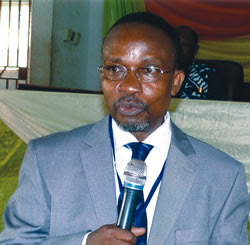EFCC grilled me for three-and-a half hours – Prof. Aje
Outgoing Director-General, Nigeria
French Language Village, Badagry, Lagos State, Prof. Sam Aje, narrates
his experience as the head of NFLV, SEGUN OLUGBILE reports
Prof. Sam Aje says his tenure as the
Director-General of the Nigeria French Language Village, Badagry, Lagos
is as inspiring as it is challenging.
Inspiring because the village has grown
to become what he calls one of the centres of excellence for the
teaching and learning of the French Language in West Africa. But as
inspiring as it is, the experience of the DG of NFLV, as he narrated
to some journalists in the village on Wednesday, is mixed. He was first
appointed as the DG of the village in 2003 for a renewable five
year-term.
Aje completed his first term in 2008 and
was reappointed for another term of five years. However, his second
term was dogged with controversies, as allegations of corruption,
high-handedness and self-promotion preferred against him nearly brought
the village to its knees.
Petitions were sent to the Economic and
Financial Crimes and other related offences Commission. Protests were
staged against him by those who said he was guilty of nepotism and
ethnicity in the way he handled appointments and promotions.
During the latter stage of his second term, some workers in the village accused him of plans to elongate his tenure.
However, speaking on his experience as
the DG, the Owo, Ondo State-born professor of Applied Linguistics, says
the claims were ploys to distract him from putting the institution on
sound footing.
On the challenges he had to contend with
as the DG, Aje says managing people who resist his efforts at making
the institution better is one of the difficulties he had.
“People resist change, and if you are a
leader that is ready to drive change, you should be ready to step on
toes. But when you do so, you should also be ready to bear the
consequences. People will call you names and do everything to frustrate
you. In fact, there are times I looked at the challenges and wondered
why people who were supposed to know better behaved as if they were
ignorant. But it is part of the headaches a leader must endure,” he
says.
But reminded about his ordeals at the
hands of EFCC officials, Aje says his experience with the commission is
one of the “injustices” he suffered as a leader.
“The EFCC issue is a disheartening one.
Anyway, people can concoct anything against you, but they must prove it
with evidences. That is what those who wrote the petition could not do.
They wrote a petition in which they raised about 13 issues against me.
These include arbitrary award of contracts, corruption, alleged refusal
to promote them to professorial positions, nepotism and alleged resort
to ethnicity in promotion.
“I went to the EFCC where I spent
three-and-a half hours under interrogation. At the end of the interview,
the petition was thrown out for lacking in merit. The petitioners have
forgotten that nobody can award a contract without due process and
diligence. You must advertise, people must show interest, they must be
prequalified and the quoted bid must be opened in public. We did all
these for all our contracts and we provided evidences for all the
contracts and the EFCC officials became annoyed with the petitioners
and threw out the petition.
“But I asked the EFCC why they could not
punish the petitioners. They told me if they did so, it would become
difficult for them to encourage Nigerians to come out and report corrupt
people. How I wish the country had a way of punishing people like
these,” he says.
On promotion, Aje explains that ignorance or sheer determination to pull him down could be responsible for the allegation.
He says, “When I resumed in 2003, my
letter of appointment indicated that I was appointed as a
vice-chancellor and so, we promoted an experienced PhD holder to the
position of a professor because we had none then. But when we commenced
the process to promote another batch of three, the then Executive
Secretary, National Universities Commission, Prof. Peter Okebukola,
wrote us that we should stop.”
According to him, the village, by
statue, did not have the right to do so. We told our people but they
said I was lying and they included this in their laughable petition.”
Speaking on the allegation that he is
not willing to go, the DG says, “Any appointment that has a tenure must
have an exit date. So, it is only a stupid man that wants to stay beyond
the time. Since three months ago, I have been planning to leave because
I know that I have a mandate of just five years. Such an allegation is a
product of ignorance.”
But he admits that one of the regrets he
has is the inability of the Federal Government to implement the French
Language Policy aimed at training and retraining experts for the
teaching of the language, which is the second official lingua franca of
the nation, after English Language.
“After the FG adopted French as the
second lingua franca, the National Council on Education, in 2004, and
some French language enthusiasts wrote a proposal to the government on
how to train and retrain teachers for the study of French. It was
approved and was thereafter submitted to the Federal Ministry of
Education, so that the cost implication could be included in the 2005
budget.
“But the thing got into a wrong person
in the ministry, who said that the FG could not fund the policy. That
ill-informed idea killed the policy and that is one of the reasons why
the national policy on French as a second language has not been
successful till today,”
He, however, adds that underfunding,
dearth of quality teachers, lack of a national policy that could mandate
undergraduates to do their compulsory language immersion programme at
the NFLV are some of the reasons why the nation has been finding it
difficult to implement the language policy.
Nigeria, he explains, should do
something urgent about shoring up the interest of Nigerians in embracing
the language. This, he notes, is because Nigerians stand the chance of
benefiting from the socio-economic and political advantages of being
surrounded by French-speaking nations.
“There are also many international jobs
that our nationals can benefit from if they have good mastery of the
language, apart from working as translators and interpreters,” he adds.
On the challenges facing French
education in the country, Aje says that most students in French
departments in tertiary institutions across the country are not
interested in the programme. “Some of them just see the programme as a
course of last resort. So, the zeal to succeed is not always in them and
this set of students cannot teach our basic and secondary school pupils
effectively because you cannot give what you don’t have,” Aje says.
He adds that substandard centres that
some Nigerian French students patronise for the mandatory immersion
programme also contribute to the low standard of French education in
the country. To get round this problem, Aje calls on the FG to mandate
all tertiary institutions to bring their students to NFLV for the
immersion programme.
“The FG should make it a policy that
studies in French must be backed up with a certificate in language from
the NFLV; and that any institution who fails to comply should not be
granted accreditation by the NUC. By the time these two go together,
they will comply. Unfortunately, many parents want their children to go
abroad instead,” he says.
He also advises the government to invest
more in French studies and education in general, as resources are
needed to drive the sector.
Aje, however, explains that in spite of
the challenges, his administration recorded some major achievements.
These, he says, include the expansion of academic departments from one
in 2003 to seven in 2013; introduction of a Master’s in the teaching of
French as foreign language, in collaboration with the University of
Lagos; and introduction of postgraduate diploma in translation and
interpretation.
He adds that workers in the institution are also exposed to human development training, seminars, workshops at home and abroad.
“The NFLV, under my administration,
also embarked on notable infrastructural developments, improvement of
existing facilities – including power generation, water supply, drainage
and flood control, road network, hostel and classroom extension and
improved health services on campus,” he adds.
News source; Punchng.com
News source; Punchng.com




Comments